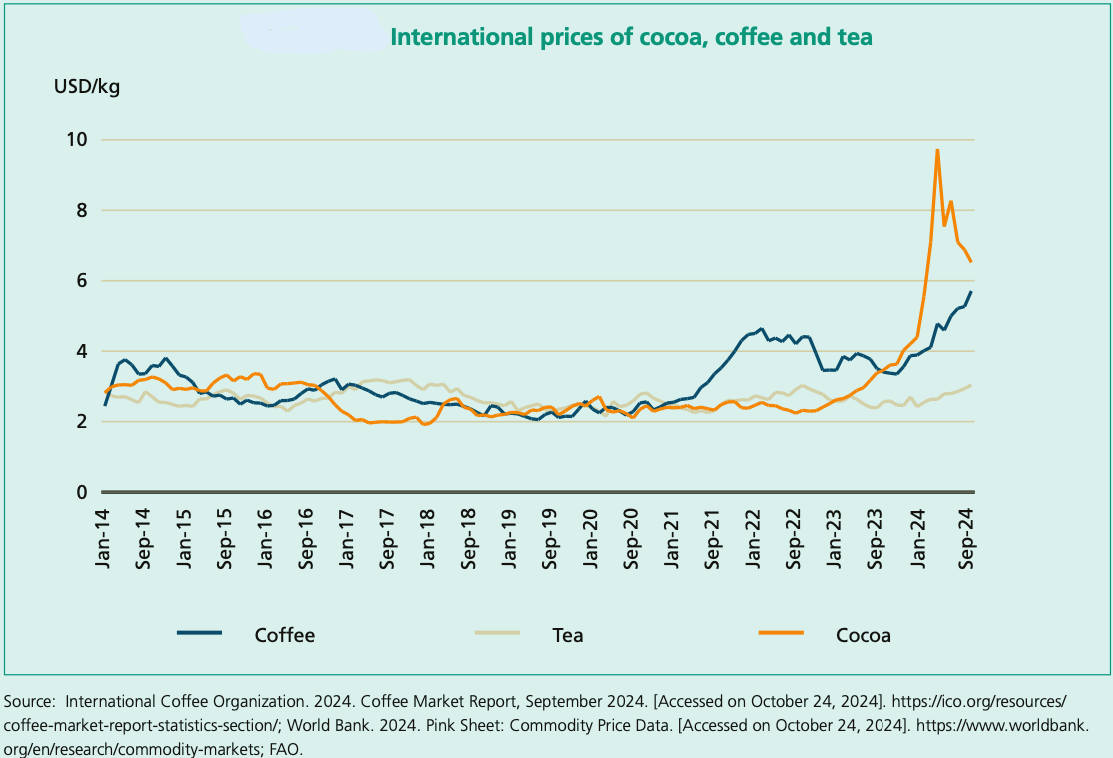
Rome: Ever considered that drinking tea could be a luxury? The figures reveal it all. Higher prices of tea along with cocoa and coffee have pushed up the global food import bill for wealthier countries, which is expected to increase by 2.2 per cent from the previous year. This increase will be more than a whopping $2 trillion in 2024 and is also buoyed by higher import costs for fruits and vegetables.
Import expenditures on tea, coffee and cocoa are anticipated to increase by 22.9 per cent, accounting for more than half of the overall increase in value terms.
International tea prices rose steadily throughout 2024, reaching a multi-year high of USD 3.0/kg in September 2024, 14.8 per cent higher than their 10-year average of USD 2.6/kg. Reduced availabilities due to severe drought in some of the major producing countries, including India, and shipping disruptions in the Red Sea underpinned the rise in international tea quotations this year.
International coffee prices increased steadily from late 2023, reaching a record high of USD 5.7/ kg in September 2024, nearly double their 10-year average (Figure 3.11). The surge mainly reflected tight export availabilities in Indonesia and Vietnam, two key exporting countries, due to adverse weather conditions curtailing the 2023/24 (October/ September) production. In addition, concerns over the impact of prolonged dry weather conditions on the upcoming 2025 crop in Brazil, the world’s largest producing and exporting country, and shipment disruptions in the Red Sea contributed to the surge in coffee prices.
International cocoa prices increased steadily throughout 2023, surging in early 2024 and reaching an all-time high of USD 9.7/kg in April 2024, driven by tight global supplies in the 2023/24 (October/ September) season. Dry weather conditions and the proliferation of the cocoa swollen shoot virus disease led to sharp production declines in Côte d’Ivoire and Ghana, which together account for over 50.0 per cent of the global cocoa bean production.
As highlighted above, tea prices rose 15 per cent above their usual long-term levels and cocoa prices reached almost four times their ten-year average earlier this year, while coffee prices nearly doubled. The soaring international prices for these commodities are mostly due to weather conditions and logistics issues, according to Food Outlook, a biannual publication of the Food and Agriculture Organization of the United Nations (FAO) released today.
Exports of these commodities play an important role in the economy of numerous countries, FAO economists noted. Coffee export earnings in Burundi and Ethiopia typically cover nearly 40 per cent of their respective food import bills, tea does the same for more than half of Sri Lanka’s bill, and Côte d’Ivoire’s cocoa exports more than offset all of the country’s food import costs.
– global bihari bureau





